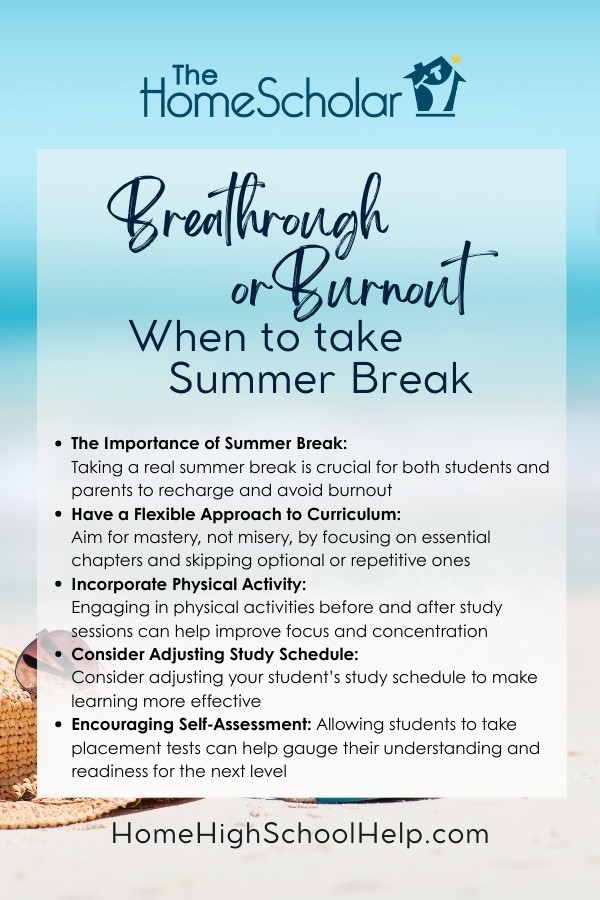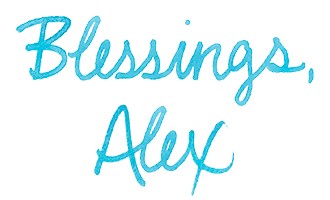Breakthrough or Burnout? When to take Summer Break
Summer break is important. Homeschoolers don't usually follow a regular school schedule, however. How do you know when to stop for the summer? When does being hardworking and persistent become harmful? At what point are we just hitting our heads against on the wall?
We got this message from Karen:
"I know that public schools do not finish entire textbooks, so I am trying to decide what to do. My son is clearly burnt out—he's in summer mode already, and May is just packed. Should I have him just stop for a while? I know he must get through Algebra 1 before he moves on to Geometry. Do we need to complete every page? I already know he is not going to want to work on this during summer. This is his first year homeschooling, and for him, summer has always meant time off. Do you know what I mean? I have a headache."
~Karen in Florida
~Karen in Florida
This was our response to her:
"I would certainly take a summer break. A real one. Although a couple of math problems for review here and there might be helpful, it is vital to remember that a BREAK can be the most important part of summer.
As for Algebra, how far along are you in the book? I would call the Teaching Textbooks support line and ask them if they can point out which chapters are optional. That would mean you don't have as far to go as you think.
If you're still pushing through, a few tweaks might help. Try putting math first thing in the day—before distractions creep in. Try cutting down the number of problems required each day. Try doing a physically stimulating activity before AND after math. Bike rides, running, ANYTHING physical can help them buckle down and concentrate. Movement boosts focus, especially for boys.
Most schools finish in June. You might want to find out what day your local public school ends and put that on the calendar. Until then, he might do a full lesson each day (first thing in the morning - no complaints allowed.) After that? Maybe just 5 problems per day "to keep your skills sharp over summer, honey, because we know how hard you worked to get those skills, and I don't want you to lose it."
You don't have to complete 100% of the text. Set a goal of 80%. Skip what's optional or repetitive (using feedback from the company and author). The goal is mastery, not misery.
Some homeschoolers will just STOP in June and pick up the book in the same place in September. That can work—but math is tough to restart midstream. Just something to think about.
For right now, at this moment, I say drop the books and start playing. Take a Tylenol for that headache, have a cup of coffee, go outside, do something physical, or take him for an ice cream."
As for Algebra, how far along are you in the book? I would call the Teaching Textbooks support line and ask them if they can point out which chapters are optional. That would mean you don't have as far to go as you think.
If you're still pushing through, a few tweaks might help. Try putting math first thing in the day—before distractions creep in. Try cutting down the number of problems required each day. Try doing a physically stimulating activity before AND after math. Bike rides, running, ANYTHING physical can help them buckle down and concentrate. Movement boosts focus, especially for boys.
Most schools finish in June. You might want to find out what day your local public school ends and put that on the calendar. Until then, he might do a full lesson each day (first thing in the morning - no complaints allowed.) After that? Maybe just 5 problems per day "to keep your skills sharp over summer, honey, because we know how hard you worked to get those skills, and I don't want you to lose it."
You don't have to complete 100% of the text. Set a goal of 80%. Skip what's optional or repetitive (using feedback from the company and author). The goal is mastery, not misery.
Some homeschoolers will just STOP in June and pick up the book in the same place in September. That can work—but math is tough to restart midstream. Just something to think about.
For right now, at this moment, I say drop the books and start playing. Take a Tylenol for that headache, have a cup of coffee, go outside, do something physical, or take him for an ice cream."
Karen wrote back:
"I like your advice in talking to the company and seeing what chapters are optional. I didn't know any chapters in a text were optional. I just wanted to make sure he was ready for Geometry in the fall. I'm going to go get that coffee now (or in my case a cup of tea!).
We just looked on the Teaching Textbook website and he said, "Hey, let me just take the Algebra 2 placement test because it looks easy and then we'll see what I know". And oh, my goodness! He passed the Algebra 2 placement with a 90%.
Note to self: when your kid is frustrated, they might not be confused—they might just be done.
Then my younger one pipes up, "If he's testing out, can I try too? I've only got two more tests left." His score? 95%.
We're officially done with the books. Just review for summer."
~Karen
We just looked on the Teaching Textbook website and he said, "Hey, let me just take the Algebra 2 placement test because it looks easy and then we'll see what I know". And oh, my goodness! He passed the Algebra 2 placement with a 90%.
Note to self: when your kid is frustrated, they might not be confused—they might just be done.
Then my younger one pipes up, "If he's testing out, can I try too? I've only got two more tests left." His score? 95%.
We're officially done with the books. Just review for summer."
~Karen
Anyone else have a story like Karen? Share below to encourage other parents!!
Stay Informed
When you subscribe to the blog, we will send you an e-mail when there are new updates on the site so you wouldn't miss them.

 Login
Login









.jpg)

Comments